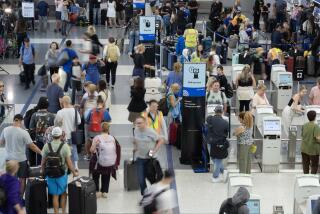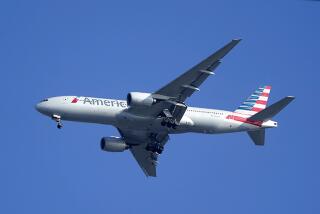Help for Stranded Airline Passengers
- Share via
Knowing how airlines handle passengers stranded by canceled flights can help travelers caught in that unenviable situation.
One basic regulation, called Rule 240, is used by domestic carriers for a variety of situations including canceled flights. This rule gives airlines the option of rebooking or rerouting passengers on flights by other airlines without necessarily rewriting tickets. In such cases of involuntary rerouting the airline you were supposed to fly on endorses your ticket over to the other carrier, with the airlines settling later.
When you are put on another airline, this can mean the original carrier will pick up any difference in air fare. You may wind up flying business or first class when your original ticket was economy. The reverse is also possible, especially when you’re in a hurry to get to your destination.
Obviously, the airlines would prefer to keep their passengers and the revenue derived from those passengers. The lengths they go to accomplish this can differ. Generally, it’s a matter of judgment on the part of the airline’s ticket agents and other staff.
‘Number of Variables’
“We have no basic guideline on how much time there has to be until the next United flight to the destination involved and when passengers are rerouted onto another airline,” said Rod Strickland, director of customer services planning for United Airlines. “There are a tremendous number of variables, depending on when the flight is canceled--the day before, several hours before, close to departure time, or right at departure time.
“We just try to protect our passengers,” Strickland added. “Travelers should realize that there is rarely any one flight that can handle all the passengers on a rerouted flight. Our agents have to scratch around to find seats, so some passengers might go on one of our later flights, others on competing airlines and some might stay over in a hotel at our expense.”
On the subject of such amenities as hotel rooms, Strickland said: “We’ll protect our passengers on any involuntary routing, regardless of the reason for the canceled flight. But amenities like overnight stays are only offered if the rerouting was United’s fault, not an act of God.”
A similar viewpoint was voiced by Mike Ferrua, regional director-airport operations for Western Airlines. “Normally, rerouting under Rule 240 is the option of our ticket agents. With a canceled flight we look immediately for seats. When the rerouting was caused by a situation under our control, we try to keep passengers with Western if we can do it without inconveniencing them for more than two hours.
“For example,” Ferrua said, “if a passenger was to fly on a canceled LAX-Oklahoma City flight we might try a LAX-Salt Lake City-Oklahoma City routing before putting the passenger on another carrier.”
Rule Saves Time
One of the great advantages of Rule 240, Ferrua added, is that there is no necessity for rewriting tickets. “This can save time, especially when time is of the essence. There might be a flight on another carrier leaving very shortly and being able to endorse over the tickets is a much quicker process than actually rewriting them.”
As to any priorities in rebooking passengers in a canceled flight situation, Strickland observed: “There’s no good way of handling it. It’s a difficult situation. We attempt to help passengers first with connecting flights they have to make, those facing specific hardships, unaccompanied minors and the handicapped.
“Often,” Strickland added, “it’s up to the passenger to make his or her specific situation and needs known. Generally, it’s first-come, first-served as far as the next flight, regardless of whether it’s on United or another carrier. But we have to make sure there is time for connections to be made, and for baggage to be transferred.”
What generally happens, Strickland pointed out, is that all the passengers cluster around the departure gate awaiting word. “More resourceful passengers may go to a phone and call United or go to an United service center to find someone to look into the availability of seats on another carrier, and some will check departures of other carriers themselves.”
One of the risks of such procedures, depending on the distance you put between yourself and the departure gate and the time you are gone, is that you may miss pertinent announcements and being available for rerouting.
Best to Stay Put
On this score, Ferrua said: “I think the best policy is to stick around the ticket agent handling your flight rather than risk being away at a crucial moment. There have been instances when some people went off to make their own arrangements, which turned out to be not as good as the ones I made for others on their original flight.”
Rule 240 may also come into play with delayed flights and schedule changes. In both situations you can ask that the airline reroute you on another carrier with a flight leaving earlier than another flight on your original airline. Citing Rule 240 won’t hurt, though each situation is different and the airline is not obligated to do such rebooking on another carrier. What kind of fare you’re traveling on can obviously have an impact.
It’s even possible to ask for such a rebooking for a rescheduled or canceled flight before you get to the airport. The airline may want to put you on one of its later flights, but you may have reason to want a flight closer to your original departure time. Again, the type of fare you’re flying on, and the difference in time between the two departures--on your original airline and another carrier--are key factors.
The situation with international travel is similar, though not under the same rule. Airlines place their passengers on other carriers in some involuntary rerouting situations.
Three Options
SAS, to illustrate, employs three basic options if its flight doesn’t depart as scheduled (because of mechanical problems, etc.): a stay overnight at an airport hotel plus meals (which may be offered in some cases even if you’re a Los Angeles-area resident) until its flight the next day; to be rerouted to another SAS gateway city, like Seattle, for another flight, with SAS picking up the cost of your Los Angeles-Seattle flight; or being rerouted onto the flight of another Europe-bound airline.
With the latter scenario, you would fly to the European gateway city of the new airline (Frankfurt, Lufthansa; Amsterdam, KLM), with SAS then taking care of your flight from that city to Copenhagen.
These options are used, more or less, on any fare and class of ticket unless you’re traveling on a ticket that is only good on SAS such as an APEX or promotional fare. In these cases, SAS would most likely not reroute you onto another airline, though the other options may be used.
More to Read
Sign up for The Wild
We’ll help you find the best places to hike, bike and run, as well as the perfect silent spots for meditation and yoga.
You may occasionally receive promotional content from the Los Angeles Times.






